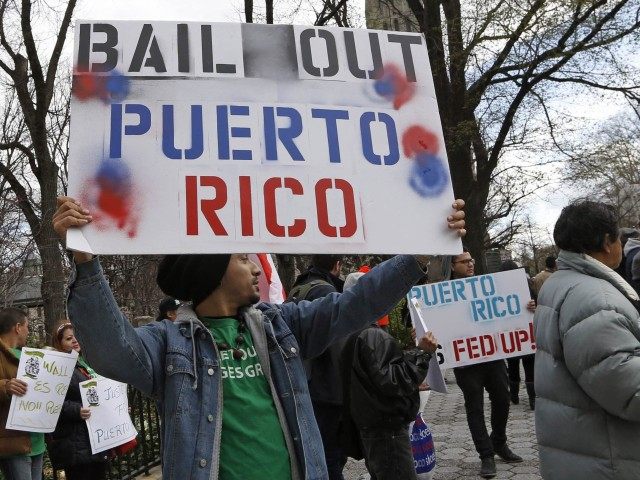Senate conservatives lost their fight to protect investors and bondholders when the Senate passed the Puerto Rico default bill, by 60 to 30 votes, on Wednesday.
Congress is now letting Puerto Rico default on all its bonds, and is forcing bondholders to negotiate for payments on their bonds with the financial control board that is established in the “Puerto Rico Oversight, Management, and Economic Stability Act,” or the PROMESA law.
The bill was negotiated by Speaker Paul D. Ryan (R.-Wis.), Treasury Secretary Jack Lew and former White House advisor James Millstein, who is the official lobbyist for the Puerto Rico government. Conservatives objected – but lost when the leaders of both parties shoved the bill through the House and the Senate.
Because of “irresponsible fiscal policies, the Puerto Rican government has found itself in a very serious financial situation,” said Sen. David Perdue (R.-Ga.), who voted against the Ryan-Lew bill. “The Commonwealth needs help tackling its debt situation, but this is not the best solution to solve Puerto Rico’s fiscal problems,” he said.
Some Democrats opposed the bill because they wanted to wipe the debt to bondholders off the books. These Democratic opponents included Sen. Bernie Sanders (I.-Vt.), Sen. Robert Menendez (D.-N.J.) and Sen. Elizabeth Warren (D.-Mass.). Liberals were also incensed because the bill allowed a lower minimum wage that the mainland level of $7.25 per hour, and because the bill exempted the island from the president’s executive actions on overtime pay.
Because the House and Senate bills have the same language relating to Puerto Rico’s default, the bill goes straight to the president’s desk without going to conference to resolve differences.
The Senate and House are rushing the bill to the president’s desk because the Puerto Rican government owes $74 billion in bonds and has stopped all debt bond payments. The territory’s Economic Development Bank missed a $422 million payment May 2 and the island’s government has blocked all future bond payments, including the $2 billion in payments due July 1.
As the negotiations took place on Capitol Hill, the biggest hurdle was how to treat the different types of debt to bondholders, because the debts are priced and traded based on their relative risk.
Agency bonds are issued by government entities or public companies, such as the Puerto Rico Electric Power company and the Economic Development Bank. General obligation bonds are promised to be paid directly from the commonwealth’s treasury. Revenue bonds are tied to specific tolls and taxes, such as the bonds funded by the island’s 11.5 percent sales tax. The agency bonds carry the greatest risk, followed by the general obligation bonds and then the revenue bonds, which were sold to bond-buyers with the promise that they would be paid first from the revenue stream they were tied to.
In the end, Congress chose to default on all the bonds, except for what is repaid via the control board.
Perdue, who made his pre-Senate fortune as a corporate turn-around manager, said the bill’s provisions which strip protections from bondholders are also a troubling precedent. “By giving Puerto Rico the ability to remove debt payment priorities guaranteed by its own Constitution, Congress is setting a dangerous new precedent that will make it even harder for the Commonwealth to access capital markets in the future,” Perdue said. “Without structural changes that get at the failed fiscal policies that pushed Puerto Rico to this point, the Commonwealth will potentially find itself facing another unmanageable debt situation down the road.”
The government of Puerto Rico is not a sovereign entity, but rather a creation of Congress, which is the territory’s true sovereign. Federal law forbids the Puerto Rican government from seeking Chapter 9 bankruptcy that is available to municipalities. This is why Ryan, Lew and Millstein had to create a new bankruptcy process for the territory.
Another opponent of the bill, Sen. Charles Grassley (R.-Iowa) said on the Senate floor before the vote that he was disturbed that the first order of business of the newly created control board, which is empowered by Congress to take over the finances of the island territory, was to study ways of shoring up the $60 billion in government pensions on the territory.
President Barack Obama and his treasury secretary have been more concerned about the pensions of Puerto Rican government workers than the retirees of the state of Iowa, said Grassley. The state’s mutual funds and 401K retirement funds have some investments in Puerto Rican bonds.
Menendez complained that the GOP’s leader in the Senate sidelined his attempts to make the bill more generous to the Puerto Rico. Menendez said the Majority Whip Sen. John Cornyn (R.-Texas) assured the New Jersey senator that in the following week the bill would be brought up with plenty of opportunity for amendments. “Well, obviously, the Majority Leader put the legislation on the table, filled the tree and now there is no opportunity for amendments,” Menendez said.
Under regular Senate rules, there are no amendments allowed beyond tertiary amendments. So a bill can have an amendment, which then can have two amendments, and then those two amendments can two have amendments. Once all seven slots are taken, the so-called “amendment tree” is filled, blocking debate on additional amendments. That’s how Sen. Mitch McConnell (R.-Ky.) used unimportant amendments to block Menendez’s amendments.
“I think the 3.5 million who call Puerto Rico home deserved more than being jammed in a legislative process,” Menendez said.
Democratic Whip Sen. Dick Durbin (D.-Ill.), spoke up for the compromise struck by the Speaker, Treasury and Millstein.
If the PROMESA bill does pass before Puerto Rico misses the payment July 1, then the bondholders will go to the courts to enforce their rights, Durbin said. “They will be holding all the cards–all the cards,” he said.
But once the president signs the bill, the bondholders will have no cards.

COMMENTS
Please let us know if you're having issues with commenting.